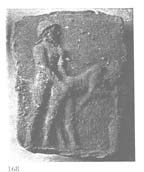The reference appears in the Acts of Isidorus an apparent description of the trial of Isidorus, the gymnasiarch of Alexandria, undoubtedly for his part in the persecutions of Alexandrian Jews during the reign of Caligula. Agrippa the king of the Jews is standing alongside Claudius watching as various Greek Alexandrians are about to be executed. The passage reads:
Isidorus: "My Lord Caesar, what do you care for a three obol Jew like Agrippa?"
Claudius Caesar": "What? You are the most insolent of men to speak ..."
Musurillo (Acts of the Pagan Martyrs p. 137) explains the term as follows:
Rostovtzeff's suggestion, that the word may here have an obscene connotation, cannot be disregarded - despite von Premerstein's strictures (see Bell, loc. cit. pp. 11 and 16) - for Agrippa remained unmarried and had been accused of sexual abnormality. It is to be noted in this connexion that, despite Claudius's many sexual aberrations, it is not recorded that he succumbed to the vice of many another emperor: see Suet. Claud. xxxiii.2 and Ruth, The Problem of Claudius pp. 39ff.
So what does Musurillo think Isidorus is driving at? Musurillo is interpreting Isidorus's comments as if they implied that Agripppa was a prostitute 'servicing' Claudius. It all comes down to the connotation of 'three obols' in contemporary parlance:
A clinching detail may be that three obols was regular pay for sailors. (Thucydides 8. 29,45; Xenophon, Hell. 1.5.7) and one of the standard prices for whores (Epicrates, 'Anti-Lais', ap.. Athenaeus 13. 570d), not to mention the many Aristophanic jokes on three-obol jurors in the 'Knights' and attendance pay for Assembly-goers in the 'Ecclesiazusae'. Commercial ladies were often designated by the fees they charged, both in Greek and Latin. Diobolic ones turn up more than once in Plautus (e. g. Cist. 407; Poen. 270), whilst Hesychius thought the expression 'Juror's fee' worth lemmatising.[Baldwin, B. (1992) 'Three-obol Girls in Procopius', Hermes 120: 255–7]
But must Isidorus really be understood to be insinuating that Agrippa was 'servicing' the Emperor? Isn't it possible that he was insulting only Agrippa, likening him to a male prostitute?
What would make Agrippa appear like a male prostitute? Could it be that he was a saris, the Aramaic word used to describe a eunuch or someone who was born with a sexual abnormality which prevented him from developing normally? Perhaps he underwent ritual castration during the hostile reign of Herod Antipas? Maybe there were stories circulating still about Agrippa's 'friendship' with Caligula from the previous age.
Yet the possibility that he was the victim of some sexual abnormality has to be taken seriously given the fact that he married his sister and never had children. All his depictions on Imperial coins show him beardless which is strange. Consider the image of the eunuch prostitute above.
It is a vivid image of one of these male cultic prostitutes appears in a terra-cotta (baked-clay) relief, photographed in Ziegler (plate 168). This piece, dated ca. 2000 B.C., was found in the ruins of the Sumerian city of Urek (called Erech in Gen 10:10 and Warka today in Iraq), located ca. 40 miles NW of Ur, Abraham's birthplace. The scene shows a standing nude male (but wearing a cap) penetrating, from behind, a cultic male prostitute, also nude, and bending over to sip beer from a jar on the floor as he carries on business. The fact that the male prostitute is beardless reveals that he is a eunuch. (This piece is part of the collections of the State Museums of Berlin in the Pergamum and Antiquities Museum).
skip to main |
skip to sidebar












Drawing on vellum. From MS CLXV, Biblioteca Capitolare, Vercelli, a compendium of canon law produced in Northern Italy ca. 825













































Burning of Arian Books After Nicaea

Drawing on vellum. From MS CLXV, Biblioteca Capitolare, Vercelli, a compendium of canon law produced in Northern Italy ca. 825


Adversus Marcionem 1.19 and Antoninus Pius's Alexandrian "Zodiac Coins" of 144/145 CE















First Argument for the Alexandrian Origins of Marcion

Second Argument for the Alexandrian Origins of Marcion

Third Argument for the Alexandrian Origins of Marcion

Fourth Argument for the Alexandrian Origins of Marcion

Fifth Argument for the Alexandrian Origins of Marcion

Conclusion

Bonus

First Piece of Evidence

Second Piece of Evidence


Third Piece of Evidence

Preliminary Conclusion

Overriding Point

Bottom Line


In Summa:

Last Word

My Academic Papers
- • Book Draft - work in progress
- • Google Docs
- • Admin -->










